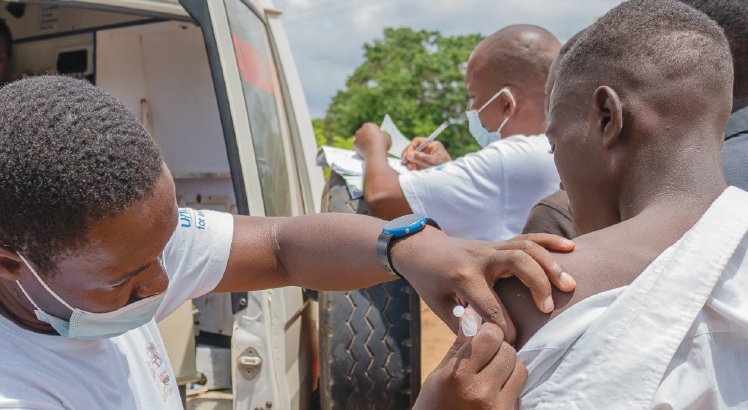A report on the implementation of Sustainable Development Goals (SDGs) at national level has revealed that the country is struggling to meet targets to eliminate poverty and reduce inequality in wealth distribution.
The National Planning Commission (NPC) which fosters the nation’s development agenda conducted the review titled the Malawi 2022 Voluntary National Review Report for SDGs published on its website www.npc.mw.
Gwengwe: Efforts are being made
The SDGs, which were adopted by the United Nations in 2015 as a universal call to action to end poverty, protect the planet, and ensure that by 2030 all people enjoy peace and prosperity.
Out of the 17 targets, the report said Malawi has made little or no progress on three: Goal One which tasks governments to “by 2030, eradicate extreme poverty for all people everywhere, currently measured as people living on less than $1.90 (K2500) a day.”
It reads in part: “Malawi has made marginal improvements in reducing poverty. However, people across the country, especially rural women, children, youth, and persons with disabilities indicate that their poverty status has worsened.
“The increase in poverty levels was mainly attributed to the rising cost of living and poor performance of the agriculture sector which is a major source of income for a larger percentage of the population.
The other is goal 10 which demands “reducing inequalities in income as well as those based on age, sex, disability, race, ethnicity, origin, religion or economic or other status within a country.”
On this finding, NPC comments: “Malawi is lagging behind other countries in economic development and needs to accelerate economic growth for the country to catch up, and possibly move beyond.
“Inequality was seen to be persistent in most communities with wealth being concentrated in a few individuals.”
The NPC also discloses that the country has not made progress on Goal 15 which focuses on “managing forests sustainably, halting and reversing land and natural habitat degradation, successfully combating desertification and stopping biodiversity loss.”
The report, however, said the country has made significant progress on four goals which are: Zero Hunger; Good Health and Well-being; Quality Education; and Clean Water and Sanitation.
It further singles out six goals where Malawi has made moderate progress on. They are: Gender Equality; Affordable and Clean Energy; Decent Work and Economic Growth; Industry; Innovation and Infrastructure; Climate Action and Partnerships for the Goals.
NPC, however, said there was insufficient data to assess progress on: Goal 11: Sustainable Cities and Communities; 12: Responsible Consumption and Production; and Goal 16: Peace, Justice and Strong Institutions.
Meanwhile, Minister of Finance and Economic Affairs Sosten Gwengwe has attributed the slow progress in implementing some SDGs to Covid-19 pandemic.
“Efforts are being put forward in the decade of action to ensure that most of the SDGs are met by 2030. The challenges in meeting some of the goals are both technical and structural.
“The socio-economic impact of Covid-19 pandemic has adversely affected the trajectory. In addressing this, Malawi with support of the UN, has developed a Covid-19 Socio-Economic Recovery Plan to build the economy back,” he writes in the report.
However, the Catholic Commission for Justice and Peace (CCJP) has blamed failure to tackle poverty on poor leadership and corruption.
CCJP national coordinator Boniface Chibwana in an interview yesterday said Malawi cannot talk about wealth creation when corruption is rife.
“There are no tangible strategies aimed at reducing poverty in the country. Our budgets over a decade are largely on consumption as opposed to developmental budget like investing in infrastructure and education for example.
“We are a country that has entrenched corruption and if a country is moving on that trajectory, then we cannot really talk of reducing or ending poverty. When corruption is rife as it is in our country then wealth is concentrated in the hands of few people thereby increasing levels of inequalities.
“If you move in rural villages and in slams in Malawi then issues of inequalities are manifested. The other reason is that we have failed to have decisive leadership in ending poverty starting from local governance levels to top leadership,” he said
Meanwhile, the Human Rights Defenders Coalition (HRDC) chairperson Gift Trapence has said they are not surprised that the country is lagging behind in the fight against poverty.
“The country has focused more on hand-outs based projects that can not uplift the majority poor from poverty line. We need real wealthy creation programs that can target the majority poor and transform the economy at the same time.
“If we are to end poverty government should rethink graduating from political programs like Affordable Input Programme and bring real programs that can turn around poverty beyond these campaign short terms based programs,” he said.
The post Mw misfires on anti-poverty, inequality SDGs targets appeared first on The Nation Online.
 Moni Malawi
Moni Malawi 

